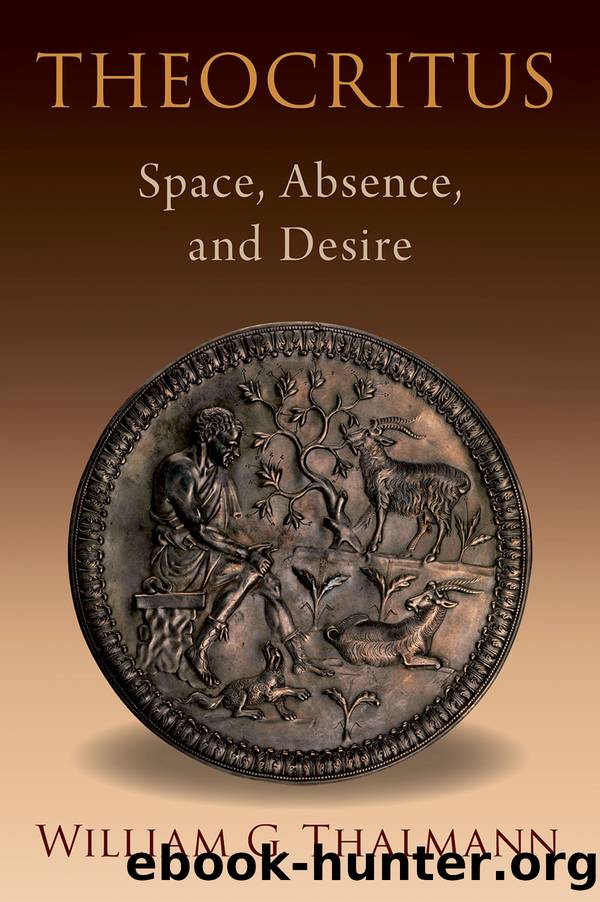Theocritus by William G. Thalmann;

Author:William G. Thalmann;
Language: eng
Format: epub, pdf
Publisher: Oxford University Press USA
Published: 2022-06-15T00:00:00+00:00
Before considering this passage in detail, it will be useful to discuss why it is not wholly satisfactory to call it an example of the âpathetic fallacy.â Some scholars, in fact, have expressed skepticism that this phenomenon has much significance in Theocritusâs poetry.41 On the other hand, J. L. Buller42 makes a strong case for its importance and argues that, although there are precursors in earlier poetry, it makes its appearance in the form in which we know it in the Hellenistic period in tandem with certain other intellectual and cultural developments. His view, however, that the pathetic fallacy implies an actual unity between humanity and nature goes to my central point here. For example, he writes in connection with pseudo-Moschusâs Lament for Bion, and particularly its first four lines, âthere is nothing in the universe which does not grieve for Bion.â43 This claim overlooks the fact that all the verbs in that passage are imperatives urging natural elements and flora to mourn, not statements that they do so. At the end of his article, Buller makes the interesting point that the reason nature grieves at human death is that plants die and germinate again, whereas individual humans die absolutely. But that is to say that the âpathetic fallacyâ is predicated on a gap between humans and nature that it only draws attention to by striving to overcome it. This is exactly the point I want to make. The advantage of doing so in terms of apostrophe is that the label âpathetic fallacyâ too often blocks further examination of how passages like the one just quoted really work. Recognizing the rhetorical trope that underlies them brings out the fictive, wishful assumptions about the world that inform them. It also illuminates what they essentially have in common with invocations of gods, such as Daphnisâs apostrophe of Pan.
What are the implications, then, when Daphnis addresses wild animals and natural featuresâthe spring Arethusa and the rivers that pour down from Thybris (perhaps the mountain with rocky gorges above Syracuse)?44 The first thing to notice is that the domesticated herd animals are not addressed in apostrophe here, even though they are earlier mentioned alongside wolves, jackals, and lions as mourning for Daphnis (Id. 1.71â75). There the herd animals were present at his feet, whereas the more distant untamed beasts could only be heard howling. Here Daphnis invokes wild animals and inanimate features of the natural world, both of which are separate from human culture, and seeks to make them present, to constitute them as feeling and responsive to him, and to put them into relation with himself. This âIâthouâ relationship is indicated by the pathos-laden á½Î¼Î¼Î¹Î½ (âfor youâ) in line 116, which I have translated rather clumsily above in order to bring out this attempt at forging a connection whereby the animals and streams are expected to feel sorrow at the loss of Daphnis. Word order stresses this assumed connection: âfor youâ is enfolded between âthe cowherdâ and âIâ (á½ Î²Î¿Ï ÎºÏÎ»Î¿Ï á½Î¼Î¼Î¹Î½ á¼Î³Ï). Daphnisâs
Download
This site does not store any files on its server. We only index and link to content provided by other sites. Please contact the content providers to delete copyright contents if any and email us, we'll remove relevant links or contents immediately.
4 3 2 1: A Novel by Paul Auster(11788)
The handmaid's tale by Margaret Atwood(7447)
Giovanni's Room by James Baldwin(6808)
Asking the Right Questions: A Guide to Critical Thinking by M. Neil Browne & Stuart M. Keeley(5355)
Big Magic: Creative Living Beyond Fear by Elizabeth Gilbert(5351)
Ego Is the Enemy by Ryan Holiday(4956)
On Writing A Memoir of the Craft by Stephen King(4662)
The Body: A Guide for Occupants by Bill Bryson(4580)
Ken Follett - World without end by Ken Follett(4443)
Bluets by Maggie Nelson(4260)
Adulting by Kelly Williams Brown(4232)
Eat That Frog! by Brian Tracy(4149)
Guilty Pleasures by Laurell K Hamilton(4116)
White Noise - A Novel by Don DeLillo(3829)
The Poetry of Pablo Neruda by Pablo Neruda(3813)
Fingerprints of the Gods by Graham Hancock(3733)
Alive: The Story of the Andes Survivors by Piers Paul Read(3729)
The Book of Joy by Dalai Lama(3695)
The Bookshop by Penelope Fitzgerald(3619)
